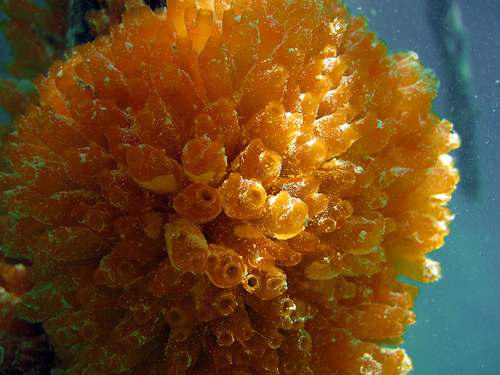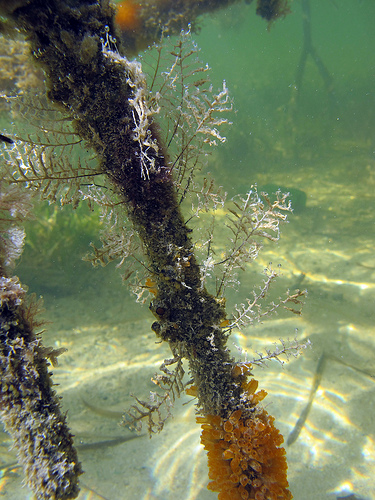ET-743: Anti-tumor Chemical
The human immune system strongly relies on its ability to discriminate between self and that which is foreign. Despite the measures taken by the immune system there are still diseases that can exploit these mechanisms. Cancer, which is the uncontrolled growth of cells, is very difficult for the immune system to fight off because the cells that are causing the problem are human. Throughout a person's lifetime their immune system is constantly ensuring that it does not attack healthy human cells. Our immune system accomplishes this by only allowing white blood cells to continue living so long as they are not reactive or harmful to human cells. With each different type of cell that is involved in human immunity, most commonly B and T cells, there are measures that keep the immune system in check. So if someone gets cancer then any B cells that may produce antibody towards the cancer cells will have already been killed. Any T cells that could induce a cytotoxic response were never allowed to grow to maturity.
With very little defense against cancer, scientists are constantly looking for new treatment. The mangrove tunicate produces a chemical known as Ecteinascidin-743. The effectiveness of tunicates at producing compounds that cancer is susceptible to is due to its highly effective ability to discriminate between self and non-self processes. It is believed that the processes possessed by these sea squirts may be early representations of some of they molecules that are possessed by humans today called MHC, the major histocompatibility complex, which presents antigens(i.e. foreign protein) to T cells. The tunicate processes may also be precursors of the sea star factor as well as rabbit lymphokines.
 Perhaps the most fascinating aspect of the
mangrove tunicate is its ability to produce a chemical known as
Ecteinascidin-743. Also known as trabectedin, with the brand name
Yondelis®
This compound has proven itself highly useful in
the treatment of some cancers. Trabectedin was developed in recent years
and has worked very well in clinical trials. It is particularly effective
against cancers that are resistant to other treatments, as well as
cancers that have relapsed after treatment of other drugs. The drug's
effectiveness is due to how it works in the body. Trabectidin is a
tetrahydroquinoline alkaloid which inhibits the activation of the
multidrug resistant pathway. The drug is a DNA interactive agent that
binds to the minor groove of the double helix and is g-selective which
inhibits activated transcription while having no affect on constitutive
transcription. This pathway is responsible for the resistance of the
cancer cells against treatment. This action is very significant because
this means that trabectidin can help people who have persistant forms of
cancer or have gone into remission preventing their cells from rejecting
the treatment. The selective nature of the drug allows it to only
inhibit the metabolic activity of the cells that are cancerous.
Perhaps the most fascinating aspect of the
mangrove tunicate is its ability to produce a chemical known as
Ecteinascidin-743. Also known as trabectedin, with the brand name
Yondelis®
This compound has proven itself highly useful in
the treatment of some cancers. Trabectedin was developed in recent years
and has worked very well in clinical trials. It is particularly effective
against cancers that are resistant to other treatments, as well as
cancers that have relapsed after treatment of other drugs. The drug's
effectiveness is due to how it works in the body. Trabectidin is a
tetrahydroquinoline alkaloid which inhibits the activation of the
multidrug resistant pathway. The drug is a DNA interactive agent that
binds to the minor groove of the double helix and is g-selective which
inhibits activated transcription while having no affect on constitutive
transcription. This pathway is responsible for the resistance of the
cancer cells against treatment. This action is very significant because
this means that trabectidin can help people who have persistant forms of
cancer or have gone into remission preventing their cells from rejecting
the treatment. The selective nature of the drug allows it to only
inhibit the metabolic activity of the cells that are cancerous.
 Trabectedin has shown to be affective against sarcomas
and is the first active agent in twenty five years to do this discovered
in the last twenty five years. It has also been shown to have potential
in treating pre-treated ovarian cancers. One of the most encouraging
signs is that it is not as toxic as traditional cancer chemotherapies.
ET-743 does not cause hair loss, diarrhea, mucositis, or neurotoxicity.
It has also been effective in causing remission in breast cancer,
melanoma, and mesothelioma.
Trabectedin has shown to be affective against sarcomas
and is the first active agent in twenty five years to do this discovered
in the last twenty five years. It has also been shown to have potential
in treating pre-treated ovarian cancers. One of the most encouraging
signs is that it is not as toxic as traditional cancer chemotherapies.
ET-743 does not cause hair loss, diarrhea, mucositis, or neurotoxicity.
It has also been effective in causing remission in breast cancer,
melanoma, and mesothelioma.
At this point you might be wondering if this is such an amazing drug that has been shown to be effective in treating so many different cancers why have I not heard of it? There have been problems harvesting the drug from the tunicates. It takes over one ton of sea squirts to produce a single gram of Ecteinascidin-743. For more information about this drug click here.
To find out where I got all this information visit the reference page and feel free to contact me.